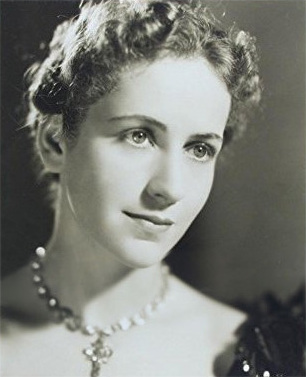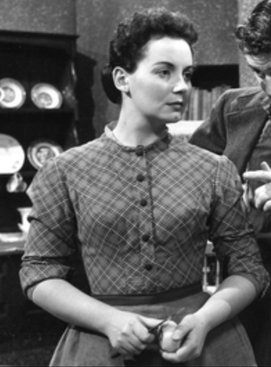Related Research Articles

Victoria Wood was an English comedian, actress, lyricist, singer, composer, pianist, screenwriter, producer and director. Wood wrote and starred in dozens of sketches, plays, musicals, films and sitcoms over several decades and her live comedy act was interspersed with her own compositions which she performed at the piano. Much of her humour was grounded in everyday life and included references to activities, attitudes and products that are considered to exemplify Britain. She was noted for her skills in observational comedy and in satirising aspects of social class.

Dame Thora Hird was an English actress and comedian, presenter and writer. In a career spanning over 70 years, she appeared in more than 100 film and television roles, becoming a household name and a British institution.
Verity Ann Lambert was an English television and film producer.

Richard Edmund Williams was a Canadian-British animator, voice actor, director, and writer. A three-time Academy Award winner, he is best known as animation director on Who Framed Roger Rabbit (1988), for which he won two Academy Awards, and for his unfinished feature film The Thief and the Cobbler (1993). His work on the short film A Christmas Carol (1971) earned him his first Academy Award. He was also a film title sequence designer and animator. Other works in this field include the title sequences for What's New Pussycat? (1965) and A Funny Thing Happened on the Way to the Forum (1966) and title and linking sequences in The Charge of the Light Brigade and the intros of the eponymous cartoon feline for two of the later Pink Panther films. In 2002 he published The Animator's Survival Kit, an authoritative manual of animation methods and techniques, which has since been turned into a 16-DVD box set as well as an iOS app. From 2008 he worked as artist in residence at Aardman Animations in Bristol, and in 2015 he received both Oscar and BAFTA nominations in the best animated short category for his short film Prologue.

Sir Joseph William Bazalgette CB was an English civil engineer. As chief engineer of London's Metropolitan Board of Works, his major achievement was the creation of a sewerage system for central London which was instrumental in relieving the city of cholera epidemics, while beginning to clean the River Thames. He was also the designer of Hammersmith Bridge.

Jennifer Bond is an English journalist and television presenter. Bond worked for fourteen years as the BBC's royal correspondent. She has most recently hosted Cash in the Attic and narrated the programme Great British Menu.

Dame Edith Margaret Emily Ashcroft, known professionally as Peggy Ashcroft, was an English actress whose career spanned more than 60 years.

The Design Museum in Kensington, London exhibits product, industrial, graphic, fashion, and architectural design. In 2018, the museum won the European Museum of the Year Award. The museum operates as a registered charity, and all funds generated by ticket sales aid the museum in curating new exhibitions.

Beryl Elizabeth Reid was a British actress. She won the 1967 Tony Award for Best Actress in a Play for The Killing of Sister George, the 1980 Olivier Award for Best Comedy Performance for Born in the Gardens, and the 1982 BAFTA TV Award for Best Actress for Smiley's People. Her film appearances included The Belles of St. Trinian's (1954), The Killing of Sister George (1968), The Assassination Bureau (1969), and No Sex Please, We're British (1973).

Margaret John was a Welsh, BAFTA award-winning actress, known for her role as Doris O'Neill in Gavin & Stacey.

Phyllis Logan is a Scottish actress, known for playing Lady Jane Felsham in Lovejoy (1986–1993) and Mrs Hughes in Downton Abbey (2010–2015). She won the BAFTA Award for Most Promising Newcomer for the 1983 film Another Time, Another Place. Her other film appearances include Secrets & Lies (1996), Shooting Fish (1997), Downton Abbey (2019) and Misbehaviour (2020).
Bernard Lodge is a British graphic designer. He worked for the BBC from 1959 to 1977 before launching a freelance career. He has been described by the Open University as a pioneer of graphic design in television.
Sid Sutton is a British graphic designer most famous for designing the Doctor Who title sequences from 1980 until 1986. The title sequences for Doctor Who were the starfield versions and were used from The Leisure Hive until the end of The Trial of a Time Lord. For 1987's Time and the Rani, Oliver Elmes designed the titles. Sid Sutton also provided the cover designs for the earliest BBC VHS Video Doctor Who releases, including The Seeds of Death and Day of the Daleks. He also created logos for Sveriges Television.
Nigel Holmes is a British/American graphic designer, author, and theorist, who focuses on information graphics and information design.
Betty Kathleen Willingale was a British television producer and script editor, best known for her work on BBC Television adaptations of classic literature in the 1970s and 1980s.

Martin John Lambie-Nairn was an English designer. He was the founder of his branding agency Lambie-Nairn and was the creative director of branding agency ML-N. He is recognised for having redefined television brand identity design, being the first to embrace computer technologies to apply branding to screen-based media.
Jenny Beavan, OBE is an English costume designer. She has received numerous accolades throughout her career spanning over four decades, including three Academy Awards, four BAFTA Awards, two Emmy Awards and a Laurence Olivier Award.
Natasha Kroll (1914–2004) was a display and production designer born in Moscow, who moved to Germany with her family in 1922. Most widely known for her production design at the BBC in the late 1950s and early 1960s, Kroll went on to design several feature films.
Ruhi Hamid is a British filmmaker, born in Tanzania of Asian origin, who has made award-winning documentaries for the BBC, Channel 4, Al Jazeera International, and other UK, US and European broadcasters. Her films have covered international stories — in Africa, Asia, Europe, South America, the USA, and the Middle East — dealing with social and political issues about women religion, poverty, health, and human rights. A graduate of London's Royal College of Art, she is also a graphic designer.
The British Academy Television Craft Award for Best Titles & Graphic Identity is one of the categories presented by the British Academy of Film and Television Arts (BAFTA) within the British Academy Television Craft Awards, the craft awards were established in 2000 with their own, separate ceremony as a way to spotlight technical achievements, without being overshadowed by the main production categories. According to the BAFTA website, this category is "to recognise originality and excellence within the title sequence and graphic identity of a programme.", also stating that "the same title sequence may not be entered more than once. The same programme may be entered in consecutive years, but only if it has new titles."
References
- 1 2 3 4 5 Beck, Ian (21 April 2015). "Rosalind Dallas: BBC graphic designer who worked on such programmes as 'Elizabeth R', 'Testament of Youth' and 'Hot Shoe Shuffle'". The Independent. Retrieved 1 October 2016.
- 1 2 Quinn, Michael (1 May 2015). "Obituary: Rosalind Dallas". The Stage. Retrieved 1 October 2016.
- ↑ "Brief". Design Week. 2 October 1998. Retrieved 3 March 2020.
- ↑ "Rosalind Dallas". Heritage. BAFTA. 8 May 2015. Retrieved 3 March 2020.
- ↑ Dallas, Rosalind (3 February 2011). "Response: We cannot allow London's 'super sewer' to devastate our communities". The Guardian. Retrieved 3 March 2020.